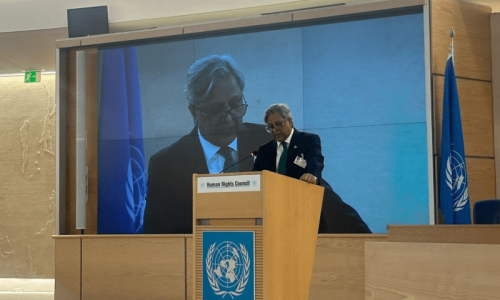KARACHI, Feb 6: Majid Majidi’s 1996 sublime emotional thriller Pidar (Father) was shown on the last day of the Iranian film festival at the Arts Council’s Manzar Akbar Hall here on Wednesday. The festival was organized by the Khana-i-Farhang – the Iranian Cultural Centre in Karachi – to celebrate the 29th anniversary of the Islamic Republic.
The film had Majidi’s masterly signature all over it, also seen in the Academy Award-nominated Bachchaye Aasman (Children of Heaven) as well as Rang-i-Khoda (The Colour of Paradise). Though the shot selection and poetic flow of the visual narrative might have been trademark Majidi, the film stood out on its own as another feather in the celebrated director and actor’s cap. Co-written by the director, Pidar follows the emotional journey of Mehrollah (played by Hassan Sadeghi), a teenager who lost his father in a road accident and has to take up a job on the Iranian coast to support his mother and three sisters, who remain in his home village.
On a visit back home, he finds out from his friend Latif that his mother has re-married, which enrages the lad, who seeks to make life hell for his step-father, a police officer (an award-winning performance by Mohammad Kasebi).
Though the step-father is kind and caring to both his wife and step-daughters, and is even willing to take in Mehrollah, emotions get the better of the boy as he launches one hare-brained scheme after another – including kidnapping his infant sisters – to get his estranged family back and humiliate the cop.
The boy is injured and taken in by his mother, who nurses him back to health, but makes off with his step-father’s official pistol in the dead of the night. Thereafter, an epic chase ensues, as the step-father pursues Mehrollah and Latif across the desolately beautiful Iranian countryside to retrieve his pistol and teach the little ruffians a lesson.
Majidi has drawn incredibly natural performances from the actors in this story of alienation and bonding, and makes full use of the striking locations his ancient country has to offer. And his story-telling techniques are top of the line, as he continues to keep the viewer in suspense about just what will happen next, right up to the heart-wrenching climax.
Both poignant and cerebral, Pidar, at least to this viewer, is what good cinema should be all about: a spiritual, cathartic experience that employs art as a medium to lift the human spirit. Maybe local film-makers should watch an Iranian film or two.—QAM











































